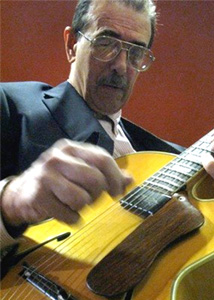 Jazz guitarist Peter Leitch was born in Canada in 1944. He released his first solo album in 1981 and about 15 more over the years. As a sideman, he has recorded with Jeri Brown, Oscar Peterson, Woody Shaw, and Pete Yellin, among others. In addition, he has worked as a journalist, photographer, and teacher. A few years ago, Leitch penned a memoir titled “Off the Books: A Jazz Life.”
Jazz guitarist Peter Leitch was born in Canada in 1944. He released his first solo album in 1981 and about 15 more over the years. As a sideman, he has recorded with Jeri Brown, Oscar Peterson, Woody Shaw, and Pete Yellin, among others. In addition, he has worked as a journalist, photographer, and teacher. A few years ago, Leitch penned a memoir titled “Off the Books: A Jazz Life.”
When Peter Leitch was old enough to start hanging out in Montreal clubs, it was at the same time that all the great jazz performers began coming through town. “It was the early 60s and their music was really the first thing I encountered in life that moved me in any way,” he says. “I don’t know why. But I do know I didn’t have any motivation in any other direction until this music caught me like it did.”
“I was given a guitar for a birthday present one year,” he continues. “I had taken a few private lessons and learned the basics, but it wasn’t really until I heard jazz that I pursued it. And I learned my craft right there on the bandstand. That’s because there was a lot of work for local musicians in Montreal back then. Nightclubs were always hiring players. You also learned from the older musicians and they were actually generous with their time.” What has the life of a jazz musician been like since then? “It’s just like any other life; you go to work and you come home,” Leitch says, laughing. “People think it’s so great to see all these wonderful cities but when you’re traveling as a working musician you don’t get to be a tourist. You see the airport, train station, hotel, and the venue, but you don’t get to see much else. I should say, though, that it was worth it because I was always moved by the music artistically.”
A few years ago, after a successful career, Leitch suffered some health issues which left him unable to play guitar. Instead, he began concentrating on composing and arranging. “That really changed the way I look at music,” he says. “I was an improvising instrumentalist for many years so I wasn’t necessarily writing down a lot on paper. Writing is the opposite of creative improvisation. At the same time, I’ve come to believe the best jazz music is a mix of improvisation and written music. I think the goal of every jazz composer is to make it seamless so that the improvisation can sound written and the written can sound improvised.”
Leitch also got very involved in photography for a period. “My ear was really developed from music and I wanted to bring my eye up to that level,” he says. “I learned photography pretty much the same way I learned music-starting from nothing and trying to develop artistically. It’s a good way to do it. You don’t learn a lot of unnecessary things or just blindly learn a technical process. Instead, you have to keep striving to make more interesting music and more interesting photographs. I think that’s the key to art: never stop trying to develop.” Then he laughs, “No pun intended!”
 Leitch and his wife, Sylvia, moved into West Village Houses on Greenwich Street in 1993. “This complex remains a legacy to Jane Jacobs,” he says. “But there’s a push by developers who think they can make a quick buck. They want to tear down these buildings and move us to another one. However, we love our home; we own our apartment and want to stay in it. It’s just crazy what they’re proposing. They couldn’t pay me enough to move!”
Leitch and his wife, Sylvia, moved into West Village Houses on Greenwich Street in 1993. “This complex remains a legacy to Jane Jacobs,” he says. “But there’s a push by developers who think they can make a quick buck. They want to tear down these buildings and move us to another one. However, we love our home; we own our apartment and want to stay in it. It’s just crazy what they’re proposing. They couldn’t pay me enough to move!”
In spite of the pressures that being in such a desirable area brings, Leitch thinks that one can still feel the sense of community and creative energy that was the old West Village. “It’s just under the fabric of the new city,” he says. “An example of this is a darkroom I used to rent in the basement of a building on Charles Street. It goes back to the 60s, still has the original equipment-like enlargers-and is still in use. So it’s a link to when the Village was full of creative artists. That’s the other thing: you never know who you’re going to meet, particularly among the older residents of the Village. There are still some very interesting people here!”
Photo: Chris Drukker
